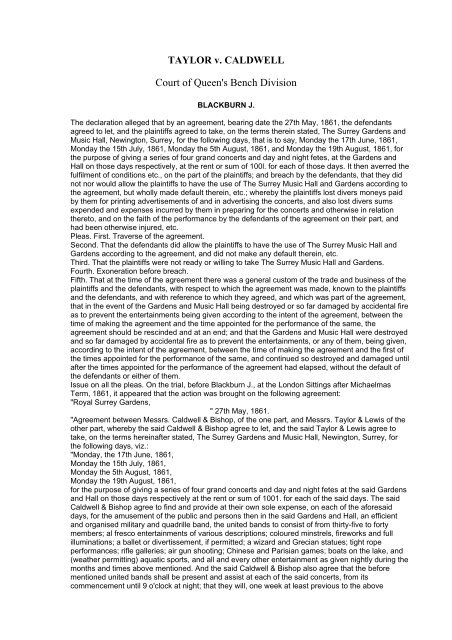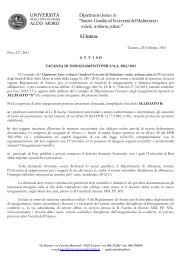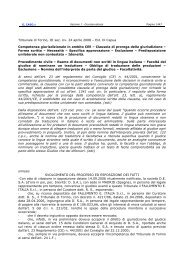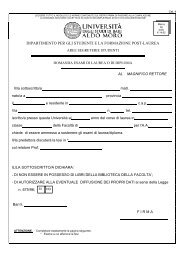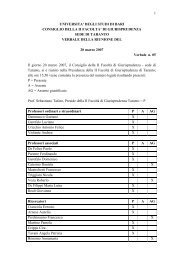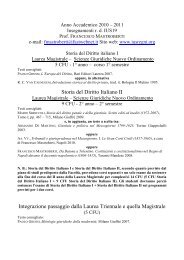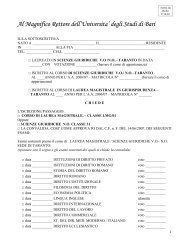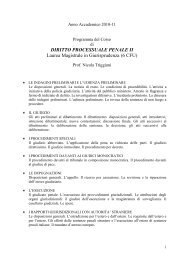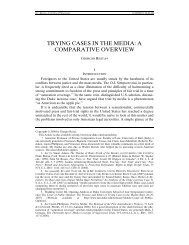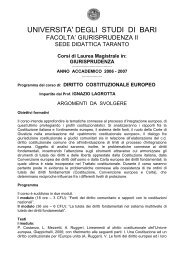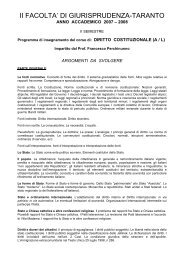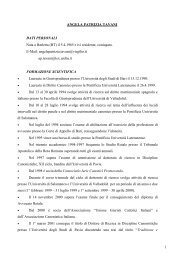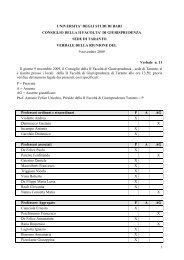TAYLOR v. CALDWELL Court of Queen's Bench Division
TAYLOR v. CALDWELL Court of Queen's Bench Division
TAYLOR v. CALDWELL Court of Queen's Bench Division
Create successful ePaper yourself
Turn your PDF publications into a flip-book with our unique Google optimized e-Paper software.
<strong>TAYLOR</strong> v. <strong>CALDWELL</strong><strong>Court</strong> <strong>of</strong> <strong>Queen's</strong> <strong>Bench</strong> <strong>Division</strong>BLACKBURN J.The declaration alleged that by an agreement, bearing date the 27th May, 1861, the defendantsagreed to let, and the plaintiffs agreed to take, on the terms therein stated, The Surrey Gardens andMusic Hall, Newington, Surrey, for the following days, that is to say, Monday the 17th June, 1861,Monday the 15th July, 1861, Monday the 5th August, 1861, and Monday the 19th August, 1861, forthe purpose <strong>of</strong> giving a series <strong>of</strong> four grand concerts and day and night fetes, at the Gardens andHall on those days respectively, at the rent or sum <strong>of</strong> 100l. for each <strong>of</strong> those days. It then averred thefulfilment <strong>of</strong> conditions etc., on the part <strong>of</strong> the plaintiffs; and breach by the defendants, that they didnot nor would allow the plaintiffs to have the use <strong>of</strong> The Surrey Music Hall and Gardens according tothe agreement, but wholly made default therein, etc.; whereby the plaintiffs lost divers moneys paidby them for printing advertisements <strong>of</strong> and in advertising the concerts, and also lost divers sumsexpended and expenses incurred by them in preparing for the concerts and otherwise in relationthereto, and on the faith <strong>of</strong> the performance by the defendants <strong>of</strong> the agreement on their part, andhad been otherwise injured, etc.Pleas. First. Traverse <strong>of</strong> the agreement.Second. That the defendants did allow the plaintiffs to have the use <strong>of</strong> The Surrey Music Hall andGardens according to the agreement, and did not make any default therein, etc.Third. That the plaintiffs were not ready or willing to take The Surrey Music Hall and Gardens.Fourth. Exoneration before breach.Fifth. That at the time <strong>of</strong> the agreement there was a general custom <strong>of</strong> the trade and business <strong>of</strong> theplaintiffs and the defendants, with respect to which the agreement was made, known to the plaintiffsand the defendants, and with reference to which they agreed, and which was part <strong>of</strong> the agreement,that in the event <strong>of</strong> the Gardens and Music Hall being destroyed or so far damaged by accidental fireas to prevent the entertainments being given according to the intent <strong>of</strong> the agreement, between thetime <strong>of</strong> making the agreement and the time appointed for the performance <strong>of</strong> the same, theagreement should be rescinded and at an end; and that the Gardens and Music Hall were destroyedand so far damaged by accidental fire as to prevent the entertainments, or any <strong>of</strong> them, being given,according to the intent <strong>of</strong> the agreement, between the time <strong>of</strong> making the agreement and the first <strong>of</strong>the times appointed for the performance <strong>of</strong> the same, and continued so destroyed and damaged untilafter the times appointed for the performance <strong>of</strong> the agreement had elapsed, without the default <strong>of</strong>the defendants or either <strong>of</strong> them.Issue on all the pleas. On the trial, before Blackburn J., at the London Sittings after MichaelmasTerm, 1861, it appeared that the action was brought on the following agreement:"Royal Surrey Gardens," 27th May, 1861."Agreement between Messrs. Caldwell & Bishop, <strong>of</strong> the one part, and Messrs. Taylor & Lewis <strong>of</strong> theother part, whereby the said Caldwell & Bishop agree to let, and the said Taylor & Lewis agree totake, on the terms hereinafter stated, The Surrey Gardens and Music Hall, Newington, Surrey, forthe following days, viz.:"Monday, the 17th June, 1861,Monday the 15th July, 1861,Monday the 5th August, 1861,Monday the 19th August, 1861,for the purpose <strong>of</strong> giving a series <strong>of</strong> four grand concerts and day and night fetes at the said Gardensand Hall on those days respectively at the rent or sum <strong>of</strong> 1001. for each <strong>of</strong> the said days. The saidCaldwell & Bishop agree to find and provide at their own sole expense, on each <strong>of</strong> the aforesaiddays, for the amusement <strong>of</strong> the public and persons then in the said Gardens and Hall, an efficientand organised military and quadrille band, the united bands to consist <strong>of</strong> from thirty-five to fortymembers; al fresco entertainments <strong>of</strong> various descriptions; coloured minstrels, fireworks and fullilluminations; a ballet or divertissement, if permitted; a wizard and Grecian statues; tight ropeperformances; rifle galleries; air gun shooting; Chinese and Parisian games; boats on the lake, and(weather permitting) aquatic sports, and all and every other entertainment as given nightly during themonths and times above mentioned. And the said Caldwell & Bishop also agree that the beforementioned united bands shall be present and assist at each <strong>of</strong> the said concerts, from itscommencement until 9 o'clock at night; that they will, one week at least previous to the above
mentioned dates, underline in bold type in all their bills and advertisements that Mr. Sims Reevesand other artistes will sing at the said gardens on those dates respectively, and that the said Taylor& Lewis shall have the right <strong>of</strong> placing their boards, bills and placards in such number and manner(but subject to the approval <strong>of</strong> the said Caldwell & Bishop) in and about the entrance to the saidgardens, and in the said grounds, one week at least previous to each <strong>of</strong> the above mentioned daysrespectively, all bills so displayed being affixed on boards. And the said Caldwell & Bishop alsoagree to allow dancing on the new circular platform after 9 o'clock at night, but not before. And thesaid Caldwell & Bishop also agree not to allow the firework display to take place till a J past 11o'clock at night. And, lastly, the said Caldwell & Bishop agree that the said Taylor & Lewis shall beentitled to and shall be at liberty to take and receive, as and for the sole use and property <strong>of</strong> themthe said Taylor & Lewis, all moneys paid for entrance to the Gardens, Galleries and Music Hall andfirework galleries, and that the said Taylor & Lewis may in their own discretion secure the patronage<strong>of</strong> any charitable institution in connection with the said concerts. And the said Taylor & Lewis agreeto pay the aforesaid respective sum <strong>of</strong> 100l. in the evening <strong>of</strong> the said respective days by a crossedcheque, and also to find and provide, at their own sole cost, all the necessary artistes for the saidconcerts, including Mr. Sims Reeves, God's will permitting. (Signed)"J. <strong>CALDWELL</strong>."Witness "CHAS. BISHOP.(Signed) "S. Denis."On the 11th June the Music Hall was destroyed by an accidental fire, so that it became impossible togive the concerts. Under these circumstances a verdict was returned for the plaintiff, with leavereserved to enter a verdict for the defendants on the second and third issues.Petersdorff Serjt., in Hilary Term, 1862, obtained a rule to enter a verdict for the defendantsgenerally.The rule was argued, in Hilary Term, 1863 (January 28th); before Cockburn C.J., Wightman,Crompton and Blackburn JJ.H. Tindal Atkinson shewed cause. First. The agreement sued on does not shew a "letting" by thedefendants to the plaintiffs <strong>of</strong> the Hall and Gardens, although it uses the word "let," and contains astipulation that the plaintiffs are to be empowered to receive the money at the doors, and to have theuse <strong>of</strong> the Hall, for which they are to pay 100l., and pocket the surplus; for the possession is toremain in the defendants, and the whole tenor <strong>of</strong> the instrument is against the notion <strong>of</strong> a letting.Whether an instrument shall be construed as a lease or only an agreement for a lease, even thoughit contains words <strong>of</strong> present demise, depends on the intention <strong>of</strong> the parties to be collected from theinstrument; Morgan d. Dowding v. Bissell (3 Taunt. 65). Christie v. Lewis (2 B. & B. 410) is thenearest case to the present, where it was held that, although a charter party between the owner <strong>of</strong> aship and its freighter contains words <strong>of</strong> grant <strong>of</strong> the ship, the possession <strong>of</strong> it may not pass to thefreighter, but remain in the owner, if the general provisions in the instrument qualify the words <strong>of</strong>grant.Secondly. The destruction <strong>of</strong> the premises by fire will not exonerate the defendants from performingtheir part <strong>of</strong> the agreement. In Paradine v. Jane (Al. 26) it is laid down that, where the law creates aduty or charge, and the party is disabled to perform it without any default in him, and hath no remedyover, there the law will excuse him; but when the party, by his own contract, creates a duty or chargeupon himself, he is bound to make it good, if he may, notwithstanding any accident by inevitablenecessity, because he might have provided against it by his contract. And there accordingly it washeld no plea to an action for rent reserved by lease that the defendant was kept out <strong>of</strong> possession byan alien enemy whereby he could not take the pr<strong>of</strong>its.Pearce, in support <strong>of</strong> the rule. First. This instrument amounts to a demise. It uses the legal words forthat purpose, and is treated in the declaration as a demise.Secondly. The words "God's will permitting" override the whole agreement.Cur. adv. vult.The judgment <strong>of</strong> the <strong>Court</strong> was now delivered byBlackburn J. In this case the plaintiffs and defendants had, on the 27th May, 1861, entered into acontract by which the defendants agreed to let the plaintiffs have the use <strong>of</strong> The Surrey Gardens andMusic Hall on four days then to come, viz., the 17th June, 15th July, 5th August and 19th August, forthe purpose <strong>of</strong> giving a series <strong>of</strong> four grand concerts, and day and night fetes at the Gardens andHall on those days respectively; and the plaintiffs agreed to take the Gardens and Hall on thosedays, and pay 100l. for each day. The parties inaccurately call this a "letting," and the money to bepaid a "rent;" but the whole agreement is such as to shew that the defendants were to retain thepossession <strong>of</strong> the Hall and Gardens so that there was to be no demise <strong>of</strong> them, and that the contractwas merely to give the plaintiffs the use <strong>of</strong> them on those days. Nothing however, in our opinion,depends on this. The agreement then proceeds to set out various stipulations between the parties asto what each was to supply for these concerts and entertainments, and as to the manner in which
contract depends upon personal skill, and the act <strong>of</strong> God renders it impossible, as, for instance, inthe case <strong>of</strong> a painter employed to paint a picture who is struck blind, it may be that the performancemight be excused."It seems that in those cases the only ground on which the parties or their executors, can be excusedfrom the consequences <strong>of</strong> the breach <strong>of</strong> the contract is, that from the nature <strong>of</strong> the contract there isan implied condition <strong>of</strong> the continued existence <strong>of</strong> the life <strong>of</strong> the contractor, and, perhaps in the case<strong>of</strong> the painter <strong>of</strong> his eyesight. In the instances just given, the person, the continued existence <strong>of</strong>whose life is necessary to the fulfilment <strong>of</strong> the contract, is himself the contractor, but that does notseem in itself to be necessary to the application <strong>of</strong> the principle; as is illustrated by the followingexample. In the ordinary form <strong>of</strong> an apprentice deed the apprentice binds himself in unqualifiedterms to "serve until the full end and term <strong>of</strong> seven years to be fully complete and ended," duringwhich term it is covenanted that the apprentice his master "faithfully shall serve," and the father <strong>of</strong>the apprentice in equally unqualified terms binds himself for the performance by the apprentice <strong>of</strong> alland every covenant on his part. (See the form, 2 Chitty on Pleading, 370, 7th ed. by Greening.) It isundeniable that if the apprentice dies within the seven years, the covenant <strong>of</strong> the father that he shallperform his covenant to serve for seven years is not fulfilled, yet surely it cannot be that an actionwould lie against the father? Yet the only reason why it would not is that he is excused because <strong>of</strong>the apprentice's death.These are instances where the implied condition is <strong>of</strong> the life <strong>of</strong> a human being, but there are othersin which the same implication is made as to the continued existence <strong>of</strong> a thing. For example, wherea contract <strong>of</strong> sale is made amounting to a bargain and sale, transferring presently the property inspecific chattels, which are to be delivered by the vendor at a future day; there, if the chattels,without the fault <strong>of</strong> the vendor, perish in the interval, the purchaser must pay the price and thevendor is excused from performing his contract to deliver, which has thus become impossible.That this is the rule <strong>of</strong> the English law is established by the case <strong>of</strong> Rugg v. Minett (11 East, 210),where the article that perished before delivery was turpentine, and it was decided that the vendorwas bound to refund the price <strong>of</strong> all those lots in which the property had not passed; but was entitledto retain without deduction the price <strong>of</strong> those lots in which the property had passed, though theywere not delivered, and though in the conditions <strong>of</strong> sale, which are set out in the report, there was noexpress qualification <strong>of</strong> the promise to deliver on payment. It seems in that case rather to have beentaken for granted than decided that the destruction <strong>of</strong> the thing sold before delivery excused thevendor from fulfilling his contract to deliver on payment.This also is the rule in the Civil law, and it is worth noticing that Pothier, in his celebrated Traite duContrat de Vente (see Part. 4, § 307, etc.; and Part. 2, ch. 1, sect. 1, art. 4, § 1), treats this as merelyan example <strong>of</strong> the more general rule that every obligation de certo corpore is extinguished when thething ceases to exist. See Blackburn on the Contract <strong>of</strong> Sale, p. 173.The same principle seems to be involved in the decision <strong>of</strong> Sparrow v. Sowyate (W. Jones, 29),where, to an action <strong>of</strong> debt on an obligation by bail, conditioned for the payment <strong>of</strong> the debt or therender <strong>of</strong> the debtor, it was held a good plea that before any default in rendering him the principaldebtor died. It is true that was the case <strong>of</strong> a bond with a condition, and a distinction is sometimesmade in this respect between a condition and a contract. But this observation does not apply toWilliams v. Lloyd (W. Jones, 179). In that case the count, which was in assumpsit, alleged that theplaintiff had delivered a horse to the defendant, who promised to redeliver it on request. Breach, thatthough requested to redeliver the horse he refused. Plea, that the horse was sick and died, and theplaintiff made the request after its death; and on demurrer it was held a good plea, as the bailee wasdischarged from his promise by the death <strong>of</strong> the horse without default or negligence on the part <strong>of</strong>the defendant. "Let it be admitted," say the <strong>Court</strong>, "that he promised to deliver it on request, if thehorse die before, that is become impossible by the act <strong>of</strong> God, so the party shall be discharged, asmuch as if an obligation were made conditioned to deliver the horse on request, and he died beforeit." And Jones, adds the report, cited 22 Ass. 41, in which it was held that a ferryman who hadpromised to carry a horse safe across the ferry was held chargeable for the drowning <strong>of</strong> the animalonly because he had overloaded the boat, and it was agreed, that notwithstanding the promise noaction would have lain had there been no neglect or default on his part. It may, we think, be safelyasserted to be now English law, that in all contracts <strong>of</strong> loan <strong>of</strong> chattels or bailments if theperformance <strong>of</strong> the promise <strong>of</strong> the borrower or bailee to return the things lent or bailed, becomesimpossible because it has perished, this impossibility (if not arising from the fault <strong>of</strong> the borrower orbailee from some risk which he has taken upon himself) excuses the borrower or bailee from theperformance <strong>of</strong> his promise to redeliver the chattel. The great case <strong>of</strong> Coggs v. Bernard (1 Smith's L.C. 171, 5th ed.; 2 L. Raym. 909) is now the leading case on the law <strong>of</strong> bailments, and Lord Holt, inthat case, referred so much to the Civil law that it might perhaps be thought that this principle wasthere derived direct from the civilians, and was not generally applicable in English law except in theease <strong>of</strong> bailments; but the case <strong>of</strong> Williams v. Lloyd (W. Jones, 179), above cited, shews that the
same law had been already adopted by the English law as early as The Book <strong>of</strong> Assizes. Theprinciple seems to us to be that, in contracts in which the performance depends on the continuedexistence <strong>of</strong> a given person or thing, a condition is implied that the impossibility <strong>of</strong> performancearising from the perishing <strong>of</strong> the person or thing shall excuse the performance. In none <strong>of</strong> thesecases is the promise in words other than positive, nor is there any express stipulation that thedestruction <strong>of</strong> the person or thing shall excuse the performance; but that excuse is by law implied,because from the nature <strong>of</strong> the contract it is apparent that the parties contracted on the basis <strong>of</strong> thecontinued existence <strong>of</strong> the particular person or chattel. In the present case, looking at the wholecontract, we find that the parties contracted on the basis <strong>of</strong> the continued existence <strong>of</strong> the Music Hallat the time when the concerts were to be given; that being essential to their performance.We think, therefore, that the Music Hall having ceased to exist, without fault <strong>of</strong> either party, bothparties are excused, the plaintiffs from taking the gardens and paying the money, the defendantsfrom performing their promise to give the use <strong>of</strong> the Hall and Gardens and other things.Consequently the rule must be absolute to enter the verdict for the defendants. Rule absolute.


